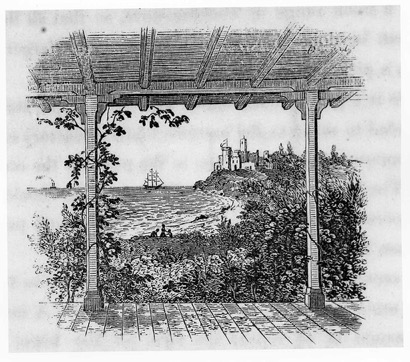Porching

Anonymous: “Bracketed Veranda from the inside,” in A. J. Downing, The Architecture of Country Houses (1850), 122, fig. 45
[A typical picture of a porch, which includes almost no porch and almost all view.]
"A porch could do a whole lot worse than get repainted."
A man could do worse than paint his porch. It's picky work, under-appreciated effort, invisible to all but the man who could do a whole lot worse than paint his porch. It's knee work. Not an ounce of any standing in it. It's demanding work of the sort that seems to goad a man into taking shortcuts and calling not quite right good enough. A man could do worse than ignore those seductions. A man begins by convincing himself that the finish just needs a little feathering but does not finish until he's scraped and sanded some boards back to their original state. Nobody will notice and nobody should. It's a covenant between this man, who could do a lot worse, and his porch, who knows it doesn't deserve it. He'll epoxy that rotted spot where the railing once anchored. Once painted, nobody knows except the man who could do worse and the appreciative porch, until some other man, who could do worse, sets about to paint his porch again. ©2021 by David A. Schmaltz - all rights reserved
Our porch is about 90% perch and 10% entryway. Like many people these days, we almost always enter through the side door, not the front. The front door lock gets cranky and it's a long slog up those massive concrete steps, so we slip in through the rose garden. I sometimes perch on the porch, looking out on the world from there. A deck above protects me and it's usually shady under there. Almost nobody ever notices me perched there spying on my own neighborhood. No spying's involved in painting a porch. It's straightforward work, essentially invisible when completed, demanding perhaps more dedication because of its essential anonymity. One paints a porch for the ages, not appreciations.
Painting a porch might be an act of self-discovery. If the porch is large, as ours is, it will become a several day effort. It will call each morning to remind you that by three o'clock the sun will have become too intense to continue working. Sweat will then start accumulating inside your shades and you'll be blinded both by the blistering sun and your own reaction to its presence. The porch will call to say that daylight is burning and you'd better get a move on. But the sander makes a terrible racket and I cannot subject the neighbors to it until at the earliest, eight. I can use the silent paint remover on some, but it would be overkill to strip every board. I'll wait until it's time to start. A man could do worse.
He becomes protective of his ward, the decking nobody ever notices supporting them when standing there. Somebody has to care in that way that doesn't care if nobody ever notices. He's creating a covenant between these lightly warped boards and himself. he will touch every centimeter of every board several times over before he's finished, a masseuse with sandpaper, scraper, broom, and brush. He imagines that, given his age, this will very likely be the last time he'll repaint this porch, his porch. His last coat lasted twenty years and he didn't know what he was doing then, though he could have done worse. He knows better now, how moisture insinuates itself and the importance of proper feathering. Knotholes remain and will affect the surface nobody ever notices after painting. It will be as if I'd covered it with invisibility paint. Once the more glaring imperfections become the same color again, nobody will notice the many imperfections in my work. They won't even notice the porch itself. A porch could do a whole lot worse than get repainted.


